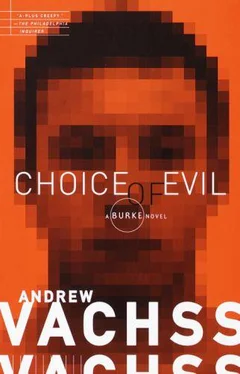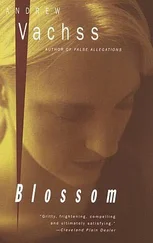“He’s stopped,” I said, sure it was the truth. “And he’s moved on.”
“How do you—”
I pulled her close to me. And, for the first time in all the years I’d known her, I told her some of my secrets.
I spoke to the ice-man the way I always do. In my mind. If I told people that Wesley answered, they’d institutionalize me. But regular people don’t get it. We have our own language, the Children of the Secret. It’s garbled gibberish to anyone else. But that wasn’t my link to Wesley. He was my true brother. We had gene-merged in the crucible of the State system for abused and abandoned kids. Even the grave couldn’t silence him when I reached out.
And when I saw the next message from the killer, I knew Wesley was right.
>>select target<<
is all he sent.
I sat there, smoking a cigarette all the way through, waiting. It got too much for Xyla. “Aren’t you going to answer him?” she finally asked.
“He doesn’t expect an answer,” I told her. “If I put one in right now, he’d get suspicious.”
“I don’t get it,” she said.
“I think I do,” I told her. “Just send this”:
come back. 72 hours.
She typed it in.
“This means I have to leave my same addy up there, you understand that, right?”
“I think I understand it better than you think,” I told her. “Go ahead and nuke your address, girl. My best guess—he’s already found you.”
“You mean. . .?”
“Yeah. I’ll be back. Three days from right now.”
How much did the killer really know? Everyone thought Wesley was a machine, but they had it wrong. Wesley was just. . . focused. Right down to a laser dot. He studied his prey, but he didn’t know anything outside of that. Didn’t matter to him. This guy—this super-killer, how much could he know about Wesley’s jobs? How they worked? The last part of his journal—at least, the last part he’d shown me—said he was going to hunt them too. But. . . “them”? I had to play it like it was a category he hunted, not a group. It was the only thing that made any sense. And if I was right, there’d only be one match.
“He’s gone,” I said.
“You’re. . . sure?”
“Absolutely,” I told Lincoln, scratching behind Pansy’s ear. “He’s well away. No chance of getting caught. He’s a million miles from here.”
“What’s he. . . like?” one of the men in the back of the room asked me.
“That wasn’t the deal,” I said. “You wanted him safe. You got him safe.”
“He’s right.” Nadine’s voice cut into the room. She was seated at the same table, but she’d replaced the lank-haired skinny woman with the same chubby blonde pony girl I’d seen in her little home video. “There hasn’t been a killing for weeks. The cops are just blowing smoke.”
“It changed things, though,” another woman said from across the room. “It’s. . . different now.”
“Sure,” an older man said, “you can walk down Christopher Street without the back of your neck tingling every time you see a crowd of straights now. There hasn’t been a fag-bashing for a good while. They’re scared. He did that. But what makes you think it’s going to last?”
“He showed us the way,” Nadine spoke up. Like she was talking about Jesus. Walking to Mecca. Following the Tao.
“What does that mean?” one of the younger guys asked, the sneer just below the surface.
“They didn’t stop because they saw the light,” Nadine said, an orator’s organ-stop in her voice, speaking to the whole room. “They stopped because they were afraid. They’re still afraid. They’re afraid of him. And now he’s gone. But he doesn’t have to go. . . .”
“What are you talking about?” Lincoln demanded.
“Nobody knows who he is, right?” Nadine shot back. “All they have is two things: letters to the newspapers. . . and dead bodies. It’ll be quiet for a while. Maybe a long while, I don’t know. But when they. . . when they start going after us again, well. . . who says we can’t write letters to the newspapers?”
“Sure, but they only printed the letters because they were authentic,” Lincoln said.
Nadine got to her feet. Eye-swept the room a couple of times to make sure everyone there was riveted to her. She took a deep breath.
“We could make ours authentic too,” she said. Softly. But everyone in the place heard her.
“This is Tracy,” Nadine told me in the alley outside the room where they’d met, a nod of her head indicating the chubby blonde.
“Pleased to meet you,” was all I could think to say.
“Turn around,” Nadine ordered her.
The blonde did it.
Nadine stepped over to the blonde, pushed her until the other girl’s face was right against the wall. Then she reached around the blonde girl’s waist, and did something with her fingers. The blonde girl made some sound, too low for me to understand. Nadine yanked down the blonde girl’s jeans and her underpants in one two-handed pull.
“Stay!” she said.
Pansy stayed too. Watching. She didn’t know what was going on, but the hair on the back of her neck was up.
It was dark in the alley.
“Light one of your cigarettes,” she said to me, just this side of a command.
I did it, wondering why even as the match flared. She snatched it out of my mouth. Looked at the glowing tip. Smiled ugly. “Want some of that?” she said, pointed at the chubby blonde.
“No,” I told her.
“Then go away,” she said, dropping her voice. “I’m going to play with her. Right out here. In public. When I’m done, she’ll carry my brand. Think about that. And remember your promise. I cleared it with the rest of them. You got your money. But you better not be—”
“I’m still working,” I said.
Then I snapped my fingers for Pansy to heel and walked out of the alley.
Why did that crazy girl think she could pull me in with sex games? I couldn’t figure it out. Couldn’t understand the cigarette thing either. That wasn’t me. Ever. It always made me. . . I could never get it, never get the part where people yearned for what other people had done to me. But I guess I did get it after all. The freaks, they set things in motion. Sometimes they make more of themselves. Sometimes they create their own hunters. I guess they don’t. . . know. Or care. I never asked one. Except when I was a kid. I remember crying, “Why?” And I remember him laughing.
I never knew what to do with all that hate until Wesley told me. A long time ago. “Fire works.” The ice-boy never played, not even back then. Not even with words.
“Rocco LaMarca,” Strega whispered to me late the next night.
“You’re sure?”
“He ran a big crew. Mostly in Westchester. The carting industry. But he lived in Connecticut. New Canaan. Very classy. Not even a whisper about him. Called himself Ronald March.”
“And he was—?”
“The cops thought it was a mob hit. An ice pick in the eye. You know what that means—he saw something he shouldn’t have. And they cut his tongue out too. Saying he said something about what he saw.”
“But how do you know he’s—?”
“It wasn’t a sanctioned hit. The Family doesn’t know who did it. But they knew about his daughter. He made. . . films of her.”
“For money? Like—?”
“No. Just to. . . show off. His. . . power. I mean, he said it was business. Showed the films to a few of the boys who were in that end. You remember Sally Lou?”
Strega, telling me she knew everything. Sally Lou ran the mob’s kiddie-sex business before Times Square felt the Disney steamroller. I love it. Disney cleans up Times Square, but they hire a convicted child molester to direct one of their movies. People protested, but the studio ranted on about giving people another chance. Sure, once it came down to money, all of a sudden, Disney’s got more faith in “rehabilitation” than an NCAA recruiter.
Читать дальше











